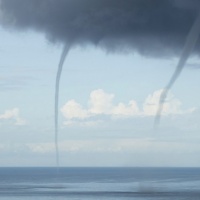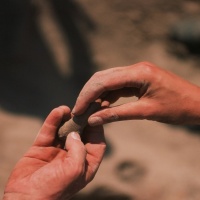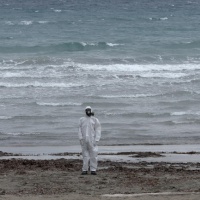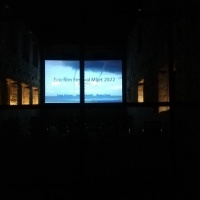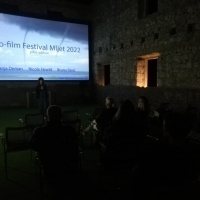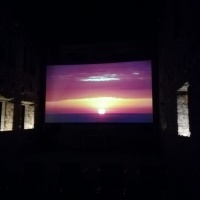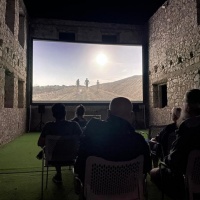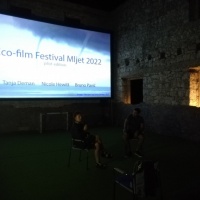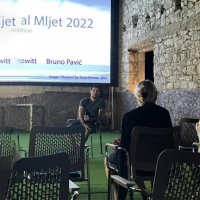Eco-film festival
Organization and production: Bona mente (Old School Gallery, Goveđari) in collaboration with Association for Interdisciplinary and Intercultural Research (Zagreb)
Support: Dubrovnik-Neretva County, Nacional Park „Mljet“, Adriatic Luxury Hotels – Hotel „Odisej“, Mljet; The Municipality of Mljet
Thanks: Kino Mediteran
Author of the concept of Eco-film Festival „Mljet“ and the curator of the film program: Sonja Leboš, cultural and urban anthropologist
Program
Open Cinema Goveđari, September, 2-3, 2022.
Friday, September 2, 2022
9 pm
“Horizon”, 2021, 25 minutes
Directing, script, narrating: Tanja Deman, DOP: Tanja Deman, Hrvoje Franjić, editing: Iva Kraljević, sound-design: Hrvoje Nikšić, drone: Niko Gulam, production: Kreativni sindikat (CRO)
9.30 pm
“Women Minor Speculation”, 2021, 60 minutes
Directing and script: Nicole Hewitt, sound&image: Ivan Slipčević, editing: Hrvoslava Brkušić, sound-design: Hrvoje Nikšić, production: Studio Pangolin (CRO)
Saturday, September 3, 2022
9 pm
“Landscape Zero”, 2020, 71 minutes
Directing: Bruno Pavić, DOP: Andrea Kaštelan, editing: Slobodan Jokić, Dragan Đokić, sound: Vjeran Šalamon, production: Udruga Kazimir (CRO)
10.15 pm
Q&A with the author Bruno Pavić (moderator: Sonja Leboš)
This year's pilot edition of the Festival presents the following films: „Horizon“ by the visual artist Tanja Deman, „Women Minor Speculations“ by the multimedia artist Nicole Hewitt, which has been awarded „Vedran Šamanović Award“ at Pula Film Festival 2022, and „Landscape Zero“ by the young video and film artist Bruno Pavić, awarded with „Dokumetar“ for the best Croatian documentary in 2021. These films are simultaneously a manifest of the Eco-film Festival „Mljet“: caring for the Adriatic Sea and connected world seas, thinking ecology from the feminist perspectives, and interlacing art and culture of living with sustainable life on Earth.
Eco-film Festival „Mljet“ is guided by the ecosophical principles of Felix Guattari and his work „The Three Ecologies“ which understands eco-political articulation as founded in three ecological registers: mental (psychological), social and ecological. The Festival is dedicated to films and discussions which transmit the imperative of coexistence of all forms of life on Earth with the aim to sustain its resources, promote ecological justice as a notion that subsumes ecological, social, and economical dimensions, and refer to the deep link between politics of sustainability and social-economic relations, but, also, inspire with beauty and incite creation of social and ecological harmony. An essential aspect of the Festival is the eco-feminist one because its founders want to address the importance of gender balance in rethinking more sustainable living. Also, the presented films will address the importance of the sea as the source of life, and the lack of human care for the life of their deep and shallow waters. The Festival takes place in the unique surrounding of the National park „Mljet“, and therefore enables an equally unique film experience in the space of the magical Open Cinema Goveđari.
In the future, the main program of the Festival will be accompanied by the annual events such as book promotions, multimedia exhibitions, ecological and eco-gastronomical workshops, film and photo workshops for children and youth from the local community, residence programs for anthropologists, screen-writers, philosophers, artists, and many other professions which tackle the sustainability of life on our planet.
About the films
“Horizon”, 25’/color/2021/CRO
Directing, script, narrating: Tanja Deman, DOP: Tanja Deman, Hrvoje Franjić, editing: Iva Kraljević, sound-design: Hrvoje Nikšić, drone: Niko Gulam, production: Kreativni sindikat (CRO)
The film “Horizon” is a personal dedication to the sea and simultaneously expresses profound concern for what we, people, do to it. “We have changed the chemical structure of the sea in a very short period of time,“ says Tanja Deman. That short period of the Capitalocene is a period of extreme extraction of natural resources so that we could, allegedly, live better lives. As the author says in her synopsis: „This film essay, shot on the most isolated open sea island in the Adriatic, observes the primordial seascape and layered environmental changes that surround it.“ Perhaps exactly these isolated islands are our points of reference which we have to learn how to preserve as our most precious fortune. Because, at the moment, the Adriatic Sea is the „depleted sea“. And as such, depleted, it still feeds and heals us. And we? How do we pay back our dues? We allow it receives excrement from cruisers and illegal sewage, diesel fuel from mega-yachts which often moor without a permit, we allow unregulated fish farming, etc. While showing us the lighthouse in a close-up, the „Horizon“ is becoming a clear warning sign.
Trailer: https://vimeo.com/525547934
“Women Minor Speculation”, 60’/color/2021/CRO
Directing and script: Nicole Hewitt, sound&image: Ivan Slipčević, editing: Hrvoslava Brkušić, sound-design: Hrvoje Nikšić, production: Studio Pangolin
„We see water, we hear a voice“ – these are the first words uttered in the film „Women Minor Speculation“. Hewitt masterly transposes the film media into an apparatus for studying our relationship with nature, attuning, as she says, that network of digital pixels with human eye pressure. The feminist perspective of the author has a trans-historical character: it follows the path of Neolithic female figures in the Danube region. As Dina Pokrajac writes: “Anthropomorphic figures found in the area of the former Eastern block symbolize invisibility of female and minor histories that we can trace within 6000 years, and get us closer to a hitherto unexplored area of contemporary archaeology as well as to gender-based rethinking of history.” The history of our rivers and our seas is our history, the history of our relationship to nature but also the history of inter-human relations in the longue durée.
The film „Women Minor Speculation“ was awarded „Vedran Šamanović Award“ at the Pula Film Festival 2022.
“Landscape Zero”, 71’/color/2020/CRO
Directing: Bruno Pavić, DOP: Andrea Kaštelan, editing: Slobodan Jokić, Dragan Đokić, sound: Vjeran Šalamon, production: Udruga Kazimir (CRO)
“Landscape Zero” by Bruno Pavić is much more than a solely post-apocalyptic elegy. It ably captured and skilfully edited the transposing of the everydayness of the post-industrial landscapes of Sućurac and Vranjica as well as the mounting of waste at Karepovac to performative variations of the series of contemporary artists – which resulted in aesthetically but also ethically contemplated sequences. In some of these sequences, Vasko Lipovac meets Andrei A. Tarkovsky (as Marko Njegić wrote in Slobodna Dalmacija after this film had opened the 26th Split Film Festival), and in some you sense the visual echo of the film “Anno Domini 1573” by Vatroslav Mimica, which reminds us of the fact that the apocalyptical state of the human spirit is also a trans-historical phenomenon. Masterly designed sound by Vjeran Šalamon underpins the atmosphere that does not allow for indifference.
“Landscape Zero” was repeatedly awarded, we would like to emphasize here the Dokumetar award for the best Croatian documentary in 2021 and Ivan Martinac Award at Split Film Festival in 2021, as well as the Special Mention at the International Festival Signes de Nuit 2021.
Trailer: https://youtu.be/k4SML6f4k24
About authors
Tanja Deman (1982) graduated from the Academy of Fine Arts in Zagreb (Department of Sculpture) and finished her post-graduate studies in Lens-based Media at Piet Zwart Institute in Rotterdam. She has been exhibiting since 2000 and has been repeatedly awarded for her work. Deman uses photography and video media whereby she studies the psychology of the environment via the works of architecture, karst landscapes, and evoking cinematic ambiances while observing the dynamics of social-political urban space that we inhabit in relation to the space we inherited. Her video works have been shown at numerous festivals in Croatia and abroad.
Nicole Hewitt (1965) graduated from the Academy of Fine Arts in Brighton and specialized in puppet animation at Jiri Trnka Studio in Prag in 1988. She did MA in Fine Art Media at the Slade School of Art in London in 2002 and got her Ph.D. title at the same School in 2013. Hewitt has been working on animated and experimental movies since 1986 and her films have been regularly screened at international festivals and exhibitions. In her work, she has been investigating the possibilities of documentary language within the fictional structure, questioning particularities of cinematic expression, the relations between representation and rhetorics, and between imaginary and real-time. Hewitt teaches animation and experimental film at the Academy of Fine Arts in Zagreb.
Bruno Pavić (1988) graduated from the Art Academy in Split (Department for Film, Media Art, and Animation). He works in the media of film and video art. Pavić established the first Croatian festival dedicated entirely to video art – Split Videoart Festival.
https://brunopavic.wordpress.com
